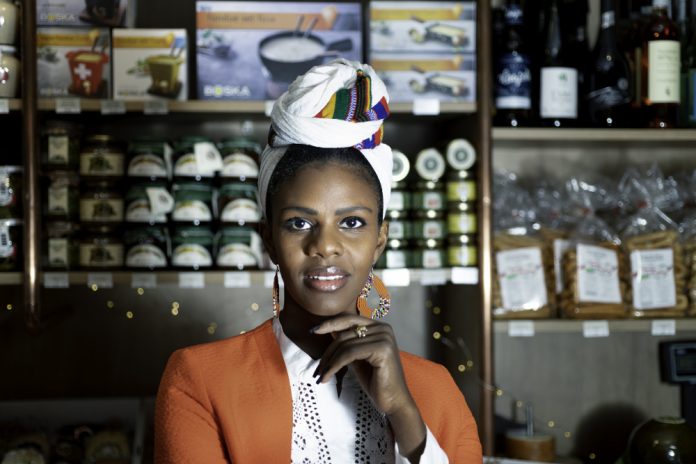“My name is Eskedar, I’m Lithuanian. I had to wait 11 years to take the Lithuanian language and constitution exam. I am not complaining, I am happy in Lithuania. I face a lot of challenges, but I don’t blame anyone for that. Not the government, not fate, not bad weather. I have learnt to accept the situation as it is and I am trying to deal with it or to live with it. I can say that I am doing very well. I care about most of the issues that are raised in society. I care about the Labanoras forest, and I care about the education reforms. I hope that next year I will also be able to make my voice heard and give my vote as a citizen to those who will do good for Lithuania and its society.
I don’t care if someone says or thinks that I am less Lithuanian than others. Quite frankly, I will not listen to these people, and I will try to prove otherwise.
I once tried to explain to my son why he is a citizen of Lithuania and Ethiopia. But he was adamant in trying to convince me that he is “100% Lithuanian”. I did not argue, because for him Lithuania is his home, he sees the tricolor flag, and he sings the national anthem.
P.s. I didn’t notice that the Pope was greeted by a dark-skinned Lithuanian girl, until my friends wrote to me saying that this might be my sweet daughter.”
We invite you to learn more about Eskedar’s views on people, Lithuania and the issues that unite the world.
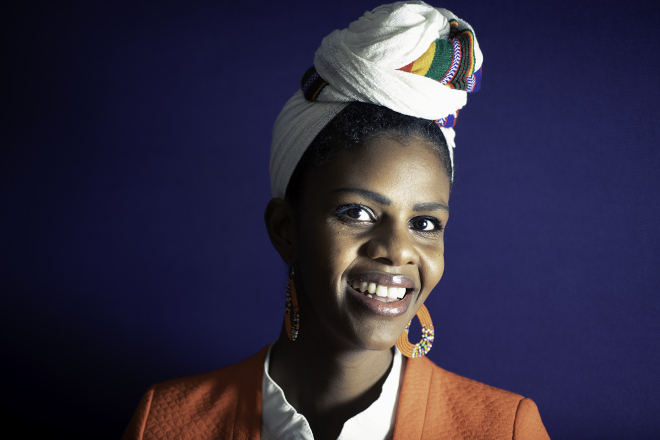
Eskedar, eleven years ago, after experiencing political persecution in your home country, you had to give up your university studies and walk across the Sahara Desert, cross Sudan, and Libya, end up in an illegal prison, and then sail to Europe in a broken boat with 26 other refugees. How did you come to settle in Lithuania, what was your first year in the country like, and what were the first things you had to do in order to settle here?
“First of all, it seems to me that it is important to come to terms with the fact that you are a refugee. It has been difficult for me to accept that fact for a very long time. For two years before I left Ethiopia (2003), I was a volunteer who went to southern Sudan to help refugees. In 2005 I became a refugee myself. In this life, you never know when you will have to ask for help yourself. When I came to Lithuania, the fact that I was a refugee and had to start all over again was the hardest part. I knew English, but I realized that this was not enough to integrate into Lithuanian society. I realized that I would have to learn Lithuanian, which is more difficult than Arabic. I studied Arabic for 11 months, and I knew English from an early age. Having learned Lithuanian for almost 12 years now, I understood that I still have to learn and improve every day. I came to Lithuania because Malta has a refugee agreement with Lithuania.
My first question was whether I could finish my studies because I left Ethiopia as a fourth year student. One month before graduation. When I asked the officials if I could finish my studies in Lithuania, they said that you can finish your studies in Lithuania. The only question that mattered to me was, when I chose Lithuania, did Lithuania choose me. When I heard this answer, I just confirmed that I was going to Lithuania. In fact, it was not very easy when I arrived, because I did not know where I needed to go, what documents I needed to submit and in what language. One day I had to sit in Gediminas Avenue and cry. Then an Indian man came up to me and said: “Are you an Indian? Are you from India? What are you doing? Are you a student?” He talked to me for about ten minutes, and I did not answer. Then I decided to tell him that I wanted to be a student, but I didn’t know where to start. Then he walked me to Vilnius Gediminas Technical University and pointed out the people who helped me. The next day I was already admitted to the university. It sounds very simple, but it was difficult because I did not know where to start.
My first job in Lithuania was as a waitress in a fast-food restaurant, then I had to work for a few months in a grocery store. In this job, I was found by the representatives of a men’s clothing store who offered me the chance to work with them. This was because they saw me explaining the price of a bun to the buyer, a grandmother. They really liked it. I left the shop and went to work for them. I worked there until 2011, when I graduated and started my own business. My first business was a clothes shop in Vilnius. I imported goods from Italy. But I had a small child and I had to go back and forth to Italy a lot. It was not easy to maintain the business and raise a child. I had to decide. What’s more, in 2013 I started teaching. At that time, I had to choose which path to follow. Teaching was a very comfortable job because I was working with young children, so that’s what I chose. This experience allowed me to reflect on my future. In 2011, I already imported my first coffee beans from Ethiopia to Lithuania, but I did not dare to start a business. I didn’t have a team, a place where I could roast coffee beans and I had to think things through. The preparation process took 7 years, from 2011 to 2018. Now we are doing well.”
How has the image of Lithuania and Lithuanians changed as you got to know the country better? What was different from your home country? Were there things that were particularly difficult to adjust to?
“It was not easy to adapt to winter (laughs). I didn’t experience a big culture shock when I came to Lithuania because the country is modern and hip. It is not culturally different from Malta, where I came from. But in terms of weather conditions, it was much warmer in Malta. Coming to Lithuania during the winter season was a shock. Now, almost 12 years later, winter is no longer scary. I just miss the snow when it is not there. I want more snow. There are no things that people cannot adapt to. Humans are designed to adapt to different situations. As far as the Lithuanians are concerned, there has been a radical change of opinion. When I first arrived, I thought that all Lithuanians were unhappy, gloomy, depressed, never smiling. However, when the summer came, I realized that they are not like that. Nobody smiles in winter because it’s just too cold to smile. I’ve obviously changed my opinion; Lithuanians are not as emotionless as I imagined. Lithuanians are very cautious, but not all of them, there are all kinds of people.”
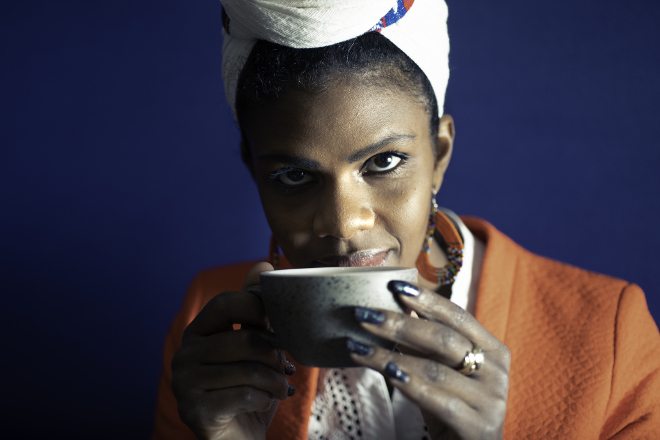
What can you tell us about your early life in Ethiopia? What do we need to know about this country, its culture, and traditions?
“I am happy that more and more people are aware and interested in Ethiopia. In the past, when I said I was from Ethiopia, people usually said it was a country of runners because they knew long distance runners. Now I meet people who call me ” the birthplace of coffee”. I am happy that the interest in Ethiopia is growing. I believe that my presence in Lithuania also contributes to that. Ethiopia is a very big country. It has 103 million people. Sometimes people ask me how many people live there and I say “only 103”. Then they ask me again and I say, “only 103 million” (laughs). Addis Ababa is not only the capital of Ethiopia, but also of Africa. Like Brussels is the capital of the European Union. We have the best runners, we have a lot of natural resources, and we have the distinction of being one of the fastest growing countries in the world. 10% a year is very good. Ethiopia is a place where people can discover a new culture and contrast. In Lithuania, I am not only working on my own project or business, but I am also consulting, liaising with the Embassy and the Ministry of Foreign Affairs in Lithuania. People can contact me and I can help them find their way to that market.”
Many are shocked by videos of groups of young African and Middle Eastern migrants kicking a woman walking peacefully down the stairs on a metro or attacking and filming passers-by in the street. There is a huge difference between the education, understanding of the world order and attitudes towards women between the locals and the refugees who come here. Will Europe be able to cope with the huge flows of migrants, and what can we do to ensure that the people arriving can integrate successfully?
“The question is broad and very interesting. It seems to me that at the moment the approach is one-sided. People do not have the time to look at the specific situation more closely. Is a criminal really an emigrant? Is he a person who has just arrived? Is he a refugee who grew up in Europe from an early age? We cannot talk about failed cases without having an effective integration system in the country or continent. There are countries that have been very successful in integrating immigrants, including refugees. And there are countries that do nothing. In these countries, crime rates are high, not only among emigrants, but also among the natives. This should also be considered. You cannot treat a person according to his ancestry. If we did, then we would have to remember that all the people in the world come from East Africa, from Ethiopia. We would all be Ethiopians (laughs).
When we make that assumption, we should be very careful about emigrants. They are often more entrepreneurial and more courageous to start something new. This information about emigrants is not just from one continent. As an expatriate, you are starting from scratch, you are not afraid to take risks. When I started working in a grocery store, I was a cleaner. I worked because I knew that if I did that, I would achieve my goal. As an example, migrant Lithuanians also leave their good, but lower-paid jobs to pick strawberries in Spain. They do this so that they can start something more successful in Lithuania or other countries. One has to be careful with statistics. Politics is politics. A populist idea will always be blown up. Both emigrants and refugees are individuals, and we need to work on each person individually. There are emigrants who do not require a large integration input to change their minds, to change their beliefs.
I myself came here as an educated person, and you do not need to tell me that it is necessary to learn Lithuanian in order to find my way in this country. Of course, if you want to find your own way. If your goals are related to this country. You have to look at each family, each person individually, because some come from a war zone. Such people have seen a lot of atrocities. They are not ready to enter the labor market when they first arrive, and perhaps they even need psychological help. There are people who have experienced sexual abuse or slavery. The victims need to find their human dignity first, because they believe that all the people around them are cruel, as they were in the past. For these reasons, there is a need for a more successful integration of different people with different experiences. Let us not say that these are bad, and these are good. We are all human beings; we are inherently good.”
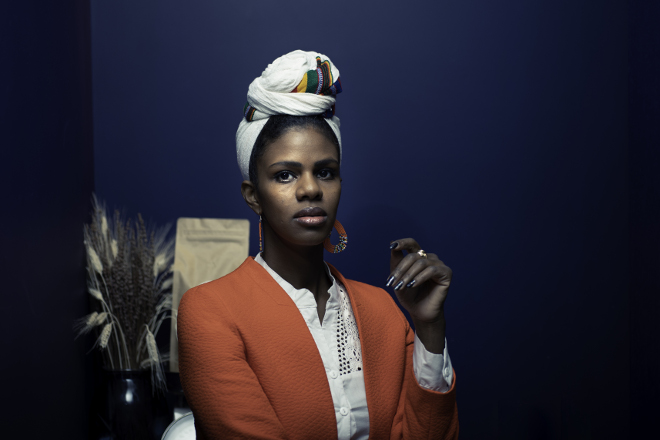
Kaunas is a city where 92% of the population is Lithuanian. The percentage of foreigners is extremely low. How can people from other cultures contribute to the city, and what should citizens keep in mind in order to embrace the change?
“My first encounter with Kaunas was when I arrived in Lithuania. We spent a couple of weeks in Pabradė, but from there we were transferred to Kaunas. In the winter, I went for a walk and got lost and found myself outside the city in the dark. It was scary and I wanted to go home. I had also heard rumors that Kaunas was an unfriendly city. I found a lot of good people in Lithuania. When I got lost, I saw five young people standing and chatting. I spoke to them in English, but they did not understand me. I didn’t speak Lithuanian yet because it was only two weeks after I arrived. One of the young men went to his house and came back with a minibus. I got in and he took me to the police station. As we were driving, I saw a large supermarket which was close to my house. I asked him to stop, and he let me go. I took his phone number and called him a year later. I thanked him for saving me. The young man was very surprised that I could speak Lithuanian. He was very happy and invited me to come to Kaunas and see the city. Kaunas is a city where, even if you are lost, you can find your way.
I don’t think Kaunas needs change. 11 years ago, everything was already good in this city. People always brighten our lives. The people of Kaunas are good people. I know a person from Klaipėda who lives in Kaunas after his studies. Kaunas is already in the center. It doesn’t matter whether Lithuanians from other cities, villages or other foreigners live there. The most important thing is that people of different mindsets and backgrounds live together in harmony. If someone chooses Kaunas, why not? If that person is doing good for the city, if he or she is working or doing business. I am glad that the initiative “Padovanok suknelę” (en. Gift a dress), which I have been running for four years now, was also held in Kaunas. Kaunas has embraced the idea and has implemented it for the second year. You don’t have to live in a special city to do something good. My relationship with Kaunas is only getting stronger.”
In Lithuania, there is currently a broad debate on whether violence against children and physical punishment, even if minimal, are possible. What is your opinion on this issue? What is needed for children to grow up safe, motivated, and able to discover their strengths?
“This is not a debate about hitting and not hitting. This is a question about the perception of violence. Two days ago, I was in an IKEA store with my son, who is four years old, and there was another mother with a son of a similar age. This child started misbehaving, and she said: “Stop it or you’ll get it.” My question is, can anyone say that this mother does not love her child? There is no clear definition of violence. What is what? We are human beings who make mistakes, even when raising children. Bringing up children is the greatest responsibility in the world and the hardest job for a human being. You have to get to know yourself all over again, because you go through life from the position of a child and then from the position of a father or mother. It all depends on how you yourself have grown up. In my culture, there is no such thing as ‘you will get your nails kicked in’, but it is said: ‘you get a stinging nettle on your bottom’. In that case, all the children would end up in orphanages.
Defining the law, understanding it, perceiving it… What is normal? What is parenthood? What is parenting? It is only when you are a father or a mother, only when you have children, that you go through that and see what your child’s upbringing is. If we want to change things, we may change things, but things will not change radically. Families need a lot of help in many different ways. Sometimes parents need help from grandma and grandpa. There are times when parents do not have that kind of help and are not in a position to leave the child. They have to bring up the child all year round by themselves. They work, they are busy with the children, and they get tired. There are children who also have special needs. Such families need help, but not to take children away. Parents can be given education.”
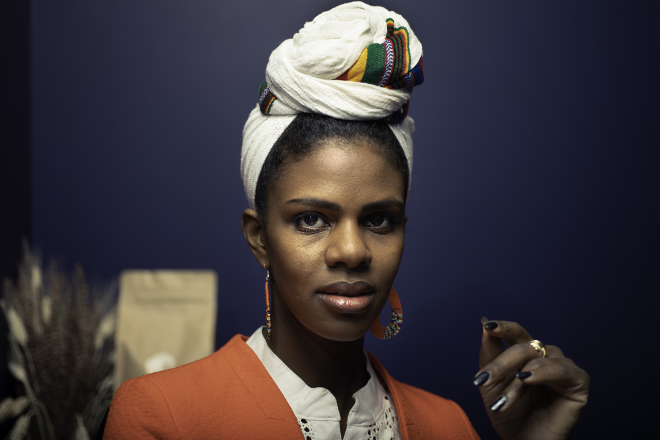
You have visited a juvenile detention center. What was your impression of this visit, and what should be done to reduce the number of children in these institutions?
“Sad. I had never seen such sights, and I did not know they existed until I visited. It is the same in orphanages, although in Ethiopia such things do not exist. If your sister or brother died and left children behind, they would certainly not appear in an orphanage. A grandmother will take them in, and if she is not there, other relatives will take care of them. We have a very broad definition of family. We collectively raise children. Everybody takes care of everybody. A neighbor takes care of your children, if they sees that you need help, they won’t just walk away. If I see minors smoking outside the school, I don’t pass either. I always call the police because that’s not allowed. They are not my children, but I care. Collective thinking keeps children out of orphanages or shelters. The number of children in those institutions is made up of many things that have an impact. The standard of living does not affect that, because if you are poor, it does not mean that you do not know how to bring up your children. It can only happen if you lack skills. That’s where you need help.
People become alcoholics because they find it hard to understand or accept that they are so. I think the biggest problem in Lithuania is alcoholism. But the question is, how did it come about? Who did it, who created it? What can we do to prevent it? Telling people that you cannot buy alcohol is not the solution. We have to take certain measures at municipal level, at regional level, at national level, to make this problem disappear or reduce it. All the problems are related to intoxicated alcoholism. Reforms are welcome, but we need to look at the context in which they work. Is it directly related to young families and their health. If there is a situation where young families are using alcohol and have a crime rate, the state must look at these families through a magnifying glass. We can protect both children and society from such losses.”
You have described UNICEF Lithuania’s charity work as a showbiz. What is wrong with organizations trying to support poor children in African countries such as Ethiopia and Swaziland and the “ambassadors” who represent them?
“I do not call UNICEF’s work a show, but I would say that the organization is called like that. This organization needs to raise money once a year to keep the company alive for the whole year. This issue is not about the image of a country, or a continent shown through a certain prism. Lithuania could benefit from seeing those countries as places where it can do business. Lithuanian entrepreneurs could then be successful, and the country would benefit financially from the investments made there. In that case, the people of Ethiopia and Swaziland would benefit because jobs would be created. This would automatically improve their standard of living. I think that the failure of UNICEF Lithuania this year is that the show did not go on. Why did the show not happen if the activities were continuing? If, for ten years, everything was done according to the rules and good work was done? These are the questions that everybody must be asking.
I am not indifferent to Ethiopia, and I am not indifferent to Lithuania. If I saw an identical situation, that Lithuanian children are being abused, and this is highlighted to everyone. The country is described as the poorest, with a high mortality rate, and so on. In that case, I would certainly speak out and I would not allow it. Lithuania is different. We have the problem of alcoholism in the regions, but we also have the best technology in the big cities. Lithuania is one of the best economically developing countries in Eastern Europe. The same is the case in Ethiopia. We have a large number of poor people, we have very rich people, but there are also wonderful conditions for doing business. In this way, we could improve the standard of living of the people there. This aid should be a sustainable business. We have to make sure that the aid does not harm either country. Poverty pornography must disappear, it cannot be. Already in the Seventies, when people were starving and struggling, Live Aid became a live-streaming show. A lot of money was raised, and then that money was used to buy weapons. The current government took advantage of that, and they managed to create socialism in Ethiopia. This is a broad subject, and one must be very careful about everything. People want to help, and that is welcome. But there are other ways of helping poor people. If you went there and lived with the locals and paid for the services and the food that they give you, you could directly influence their growth. Just don’t contribute to some company that will give money to other companies. This kind of money journey is a long one, and usually does not reach the target audience or reaches a very minimal amount.”
You are not indifferent to world events. What is your opinion of Donald Trump and a country that has not been able to elect a single woman president in 242 years?
“The irony of democracy. Anyone can be president. Even a person who had a television show can be the most powerful person. He can even look askance at other presidents. For instance, the relationship between Vladimir Putin and Donald Trump. They do not loudly condemn the political gamesmanship when it comes to the assassination orchestrated by a Saudi prince. There has been no reaction from the American side so far. It is the irony of life when a country is democratic, but their democratic system is broken. Every vote does not count as a vote. Not all votes have equal weight. America wants to have democracy all over the world. That is why they are waging war with other countries. But in terms of America itself, democracy, discrimination against women, patriarchy, the election of Donald Trump as President is an irony to me. But I want to welcome Ethiopia’s progress this year. We have managed to elect a new Prime Minister; the first female President in Ethiopia’s history and we even have 50% women in Parliament. This is a great achievement. Dalia Grybauskaitė winning the presidency was a big surprise for me, a woman president. Now I see the same picture in Ethiopia.”
You are probably watching the Russian military aggression in Ukraine. What are your feelings, as someone who has experienced political persecution and who has three children, about a dictator who is not quite adequate and who has one of the largest armies near Lithuanian borders?
“I am saddened by the indifference of most European countries. Only recently, we have seen invasions in Ukraine, and the people have been repressed. We also feel threatened from the east. What is happening in Ukraine and in Sakartvelo demonstrates to us that Russia is indeed a country that is arbitrary in other countries. The countries of the European Union look on indifferently, as if nothing bad is happening. Business is still going on, the embargo is not working, and, to this day, we are even seeing Ukrainian prisoner-of-war sailors. It is sad because of the indifference of many European countries. But I am glad that Lithuania always has a strong opinion and speaks out about Russia.”
How and why do you think fear or hatred of people of a different skin colour, religion or sexual orientation arises? What can be done to reduce these phenomena in our society?
“We always make ambiguous statistics that can show both sides. The Lithuanian people are not racist or homophobic. The media will always write in such a way as to cause people to fear. Fear is a way of controlling people. When people are afraid, they vote for one candidate or another, they choose one decision or another. Donald Trump is very good at exploiting this. All the terrorists, all the bad guys, all want to come to our country. Though there are many people who do not really want to. Emigration in the world will increase, that is a fact. We will have natural disasters in the world that will wipe out islands. Our consumerism is causing a great many problems for the planet. We will have even more unsolvable problems in the future. Whales and turtles are dying from plastic. Our world depends entirely on our own decisions.
Does your life really change, get better or worse, if your friend is homosexual. What influences their choice? I live by the philosophy that if it is good for someone else, it is good for me. Happy people don’t do bad things to others. Let people live in peace, happiness, harmony. That is helped by the religious saying, “Don’t do to others what you wouldn’t want them to do to you”. If we lived by that, we would be happier. If you want to be loved, you love. If you want to be respected, you respect others. If you want to receive help from others, you must also give help to others. Let us live by this, and all will be well.”
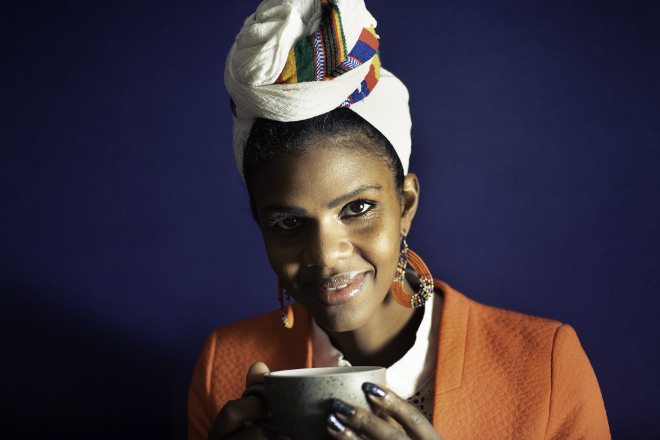
You set up a business in Lithuania and launched your own brand of coffee. Was it difficult and what barriers or challenges do you face in your daily business activities?
“I haven’t faced any barriers. There are no things that hold you back, only the illusions and fears you create. For sure this coffee business will grow as much as I see it growing. If I say I want to go global, it will. I had a vision 8 years ago to do a coffee business because Ethiopia is one of the biggest exporters of quality coffee. Coffee was discovered in Ethiopia. It is like a gift to humanity from Ethiopia. I wanted to start building a bridge between Lithuania and Ethiopia through coffee. The feedback will be Lithuanian companies interested in investing in Ethiopia. You always have to look at what you can best offer to the market and where you see opportunities.
There is a place for Ethiopian coffee in Lithuania because most people still have the attitude that coffee is bitter. We are busting the myths and proving that Ethiopian coffee has a fruity aroma and flavor. People often ask if this is real coffee. Our coffee has a wide variety, with over 100 flavors. Lithuania will discover more than just coffee in these flavors. This business is not a hardship that pushes you to give up. The import requirements in Lithuania could be a little looser or the same as in other European countries. Lithuania may lose investors because of paperwork requirements that do not exist in other countries. For example, it is easier to ship coffee to the Netherlands and from the Netherlands to Lithuania than directly from Ethiopia to Lithuania. But everything else is fine.”
You are married to a Lithuanian military man, and you have said that you would not only be happy to serve in the Lithuanian army yourself, but also to allow your daughter to join the army too. Why do you think women should take an active part in the defense of the country?
“I believe in equal rights, which is not supported by “comfortable and warm”. If a boy who has completed 12 grades has to serve, why can’t girls do the same? Why should one girl go to university and another to the army? If there is a level playing field, people will be more prepared to defend the country. Moreover, they need to learn skills, see discipline, understand hard work (physical training). All in all, this brings positive things. If needed, I will volunteer in the army myself. I have to serve because it is a duty. Lithuania has missions in Afghanistan, Iraq, and other countries. Equal rights and equal responsibilities.”

